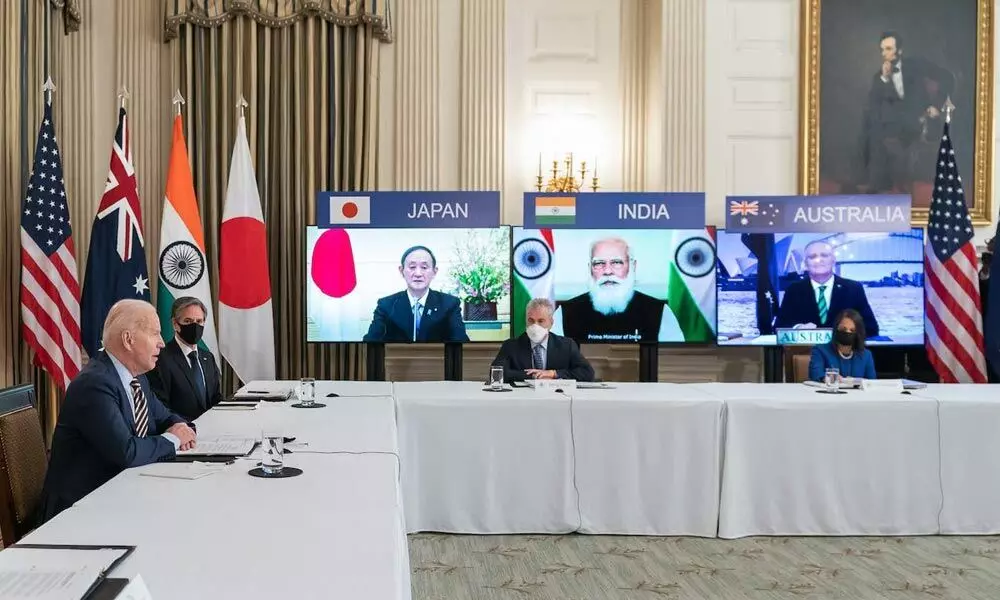Twin Quad, Aukus will not change China's behaviour towards nation-States
The democratic and developed nations led by the US are forming regional strategic group directly aimed at China
image for illustrative purpose

After Nazi Germany, it is the communist China that is giving the global leaders sleepless nights due to its expansionist mindset and hegemonic behaviour. Xi's China has tried to suppress nations using hybrid warfare that combines threatening military posturing leading to clashes, domination of geostrategic locations through economic deceit and intimidation through Chinese wolf warrior diplomacy.
So, what would it take to check President Xi Jinping's global domination dream?
The Chinese military posture from Galwan, Taiwan to the South China Sea and economic dictates to Sri Lanka and beyond has forced nations to respond collectively.
The democratic and developed nations led by the US are forming regional strategic group directly aimed at China.
The most recent group formed is the Middle Eastern Quad, including India, Israel, the United Arab Emirates, and the United States. The formation of the Middle Eastern group came close on the heels of the announcement of Aukus, where the UK, US and Australia entered into a historic security pact. The Aukus pact, one of the "biggest defence partnerships" among the grouping, is seen as an effort to counter China.
Then there is the Indo-Pacific Quadrilateral Security Dialogue or the Quad, which includes Australia, India, Japan, and the United States. It is clearly aimed at countering expansionist China.
As the world, especially the undeveloped and third world nations, wake up to the real intent behind Chinese development projects and loans - many more such mini groupings aimed directly or indirectly at China can emerge with the backing of developed nations.
The question is, are these measures enough to stop China on its track. The answer is no! There are four reasons why Xi's China will not pull back easily.
1. The Chinese Century: China was projected to dominate the "21st century by geoeconomically or geopolitically" due to its global economic power. Furthermore, communist China expanded and modernised its military to support its global ambition. President Xi has been successful through his actions & initiatives on the world stage to convince his people and the world that "China's time has come" to be the global leader. This conviction has influenced China's approach towards its neighbours, particularly with smaller nation-states along its borders.
2. Challenging America's Superpower statues : The recent US withdrawal from Afghanistan presents the world and China, particularly an impression that America is a declining power. Thus, Beijing believes it is the rightful leader to replace the US. That explains the speed with which China tried to force a relationship with the Taliban in Afghanistan. A good working relationship and presence across Afghanistan could stamp China as an acceptable partner over the US. Such a projection would help achieve a foothold in other war torn nations and occupy the mind space among emerging and underdeveloped economies. Beijing's goal is clearly to "dethrone and replace Washington as the world's preeminent power."
3. Military posture: China has modernised its military and has deployed it around the world aggressively. The Chinese military has used intrusions and military confrontation with its neighbours to command its military authority. The military leaders too actively seek confrontation, resulting in military clashes and standoffs from Gulwan to the South- China sea. Though the Chinese were hammered out of senses by the Indian army in Gulwan- China still feels its military can take on global power due to its nuclear status, advancement in space technology and independent military production capability.
4. Economy Deceit the Dragon trap: Beijing has mastered economic warfare - where it has used financial deceit, under the grab of building infrastructure in less developed nations, to indulge in grabbing land of strategic importance. Projects such as China–Pakistan Economic Corridor (CPEC)that connects China with Pakistan through POK and Belt and Road Initiative (BRI) also known as One Belt One Road that involves over 70 countries, helped China gain access and ownership of strategic seaports and geographic locations. "According to the four-year study by US-based research lab AidData, 165 countries owe Beijing a combined debt of at least $385 billion." The sole aim of these dragons' debt trap has been to enhance China's geostrategic presence. Having succeeded in acquiring most of its purposes, Xi is convinced that China is unstoppable in its quest for global domination.
Every time global leaders get into a huddle - the top question on their minds must be - What would it take to put the Chinese genie or say the dragon back in the bottle?
The answers are not simple, yet recent developments such as the formation of twin Quads and Aukus suggest that the world wants to tie-down China through "minilateral" military and economic grouping. According to analysts, "the Biden administration is now actively involved in responding to China in multiple regions."
China should know that its leadership role in global affairs is not given until it mends its world approach.
(The author is Major SM (retd), Founder of MyStartup TV)
Major Sunil Shetty, SM(retd)

